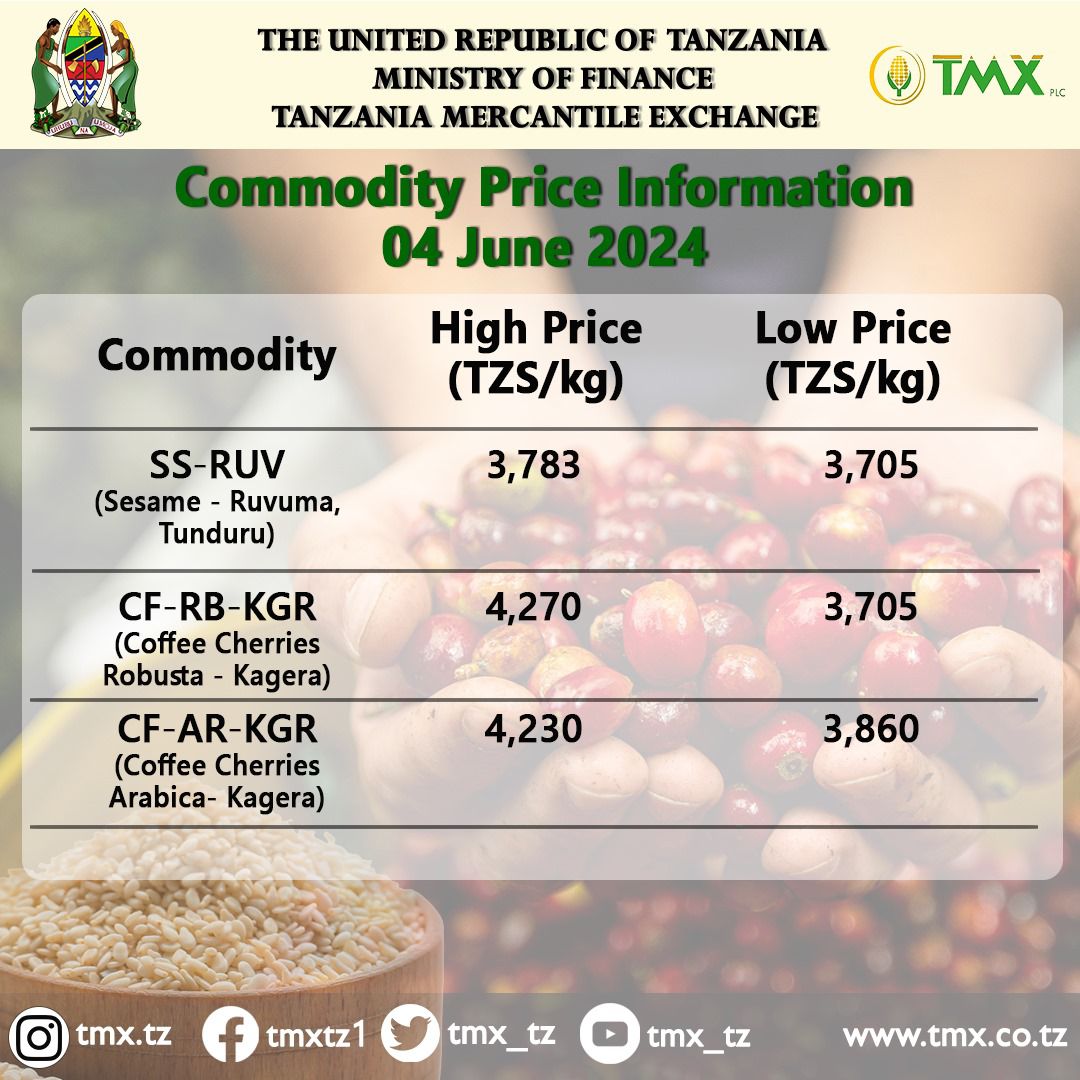Tanzania ranks 19th on coffee production according to Statista, and the International Coffee Organization. Since 2015, coffee production has increased by 22% to an annual harvest of about 73,000 metric tons per year. The country mainly produces good quality of Arabica and Robusta coffee in highland regions where coffee flourishes better including Kagera, Kigoma, Mara, Kilimanjaro and Mbeya and Ruvuma. Coffee production and sales are managed by the Tanzania Coffee Board which oversees coffee harvest seasons, auctions, purchase and export licenses. In April 2024, The Tanzania Coffee board announced the start of new seasons per regions, starting with Mara on 20th April 2024, Kigoma on 1st May 2024, Kagera on 1st May 2024, Mbeya on 15th June 2024, Ruvuma on 1st July 2024 and Kilimanjaro: 1st July 2024.
As the new harvests kicked in, the market witnessed an abnormal spike in prices compared to last year. The Tanzania Mercantile Exchange (TMX), the Government body that oversees online auctions for agricultural products, coffee included, started the coffee auctions on Tuesday 4th June 2024. Normally, coffee is grown in family-owned plots, and farmers collect their produces at the Agricultural Marketing Cooperative Societies (AMCOS). These are established unions across villages and wards which facilitates collection and quality check of dry coffee cherries before the actions. The system also ensures transparency on prices, quality of coffee and a channel through which farmers receive subsidies such as fertilizers.
On the first online auction, conducted by the Tanzania Mercantile Exchange (TMX) Plc, a kilogram of Robusta coffee was sold at a maximum of TZS 4,270 (equivalent to USD 1.53) and Arabica was sold at a maximum of TZS 4,230 (equivalent to USD 1.51). Compared to last year’s prices, the market price for dry cherry has almost doubled. While this may be good news for farmers as they expect higher return on their investment, speculators are concerned about the market volatility and its long-term impact on coffee trade in Tanzania. Both prices for Robusta and Arabica has continued to increase on auctions done on 6th, 11th and 13th May, fetching a maximum of TZS 5,115 (Robusta) and TZS 5,135 (Arabica) per the kilo of dry cherry which translates to a 19.7% and 21.4% increase respectively.

Credits: Tanzania Mercantile Exchange (TMX) plc
It is well known that the hike in coffee prices is related to the drop in production in other leading countries such as Brazil and Vietnam which has been affected by severe weather changes such as dry spells, heavy rainfall which resulted in floods and destruction of coffee trees. In 2024, Brazil is expected to produce 15% less Arabica and Robusta beans, which translates to 10 million bags less in the market. Vietnam is also expected to decrease its production by 30-35%. Despite of the decrease in coffee production, it is expected that coffee demand will increase by 2-3% globally.
What does this mean to Tanzania farmers? While the coffee price spike may be temporary, pending factors in other countries this is a welcome news to coffee producers in Tanzania. Coffee has for a long time been a significant cash crop in the country, but farmers has not relatively benefited from the cash crop due to lower and fluctuating farm gate prices. This led to a fluctuating yield and less investment on coffee production. The increase in price, however brief, may encourage farmers to plant more coffee trees, in hopes of taking advantage of the spike in coffee prices in the future.
LICO Global, your trusted exporter of coffee and spices from Tanzania continue to analyze market trends and bring to you the insights from the market to enable you to make informed business decisions. We continue to source, supply and export high quality green coffee beans globally, as well as exotic spices from Tanzania, such as cinnamon, cardamon and cloves.
Follow us on our social media @lico_global

